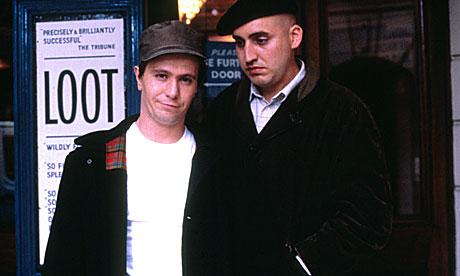
When, on the 9th August 1967, Kenneth Halliwell beat Joe Orton to death in their north London bed-sit and then took his own life, it was perhaps the most extreme example of what can happen when literary collaboration goes awry.
Officially, Orton and Halliwell had stopped collaborating a few years previously – having only a couple of unpublished novels and a pair of six-month jail sentences for defacing library books to show for their troubles – and it is easy to view Orton's success as a direct consequence of being liberated from the less-gifted Halliwell. However, Orton's diaries reveal that he continued to tap Halliwell's ideas when necessary:
"I finished typing What the Butler Saw. I added very little on this version (just incorporated Kenneth's suggestions which were excellent) … I can now give my mind full rein for the historical farce set on the eve of Edward VII's coronation in 1902 and called (at the moment) PRICK UP YOUR EARS. I hope I can write a play worthy of one of Kenneth Halliwell's most brilliant titles."
For Halliwell, the instigator and driving force behind their initial collaborations, his subservient role in Orton's subsequent success must have been particularly galling. I imagine that literary collaborations are highly fraught at the best of times – but throw emotional dependency, mental illness, and psychosexual drama into an already-heady brew and Halliwell's final desperate act, while in no way excusable, does perhaps become a little easier to understand.
To my mind though, even the most professionally-conducted collaborations have something illicit about them. They are like secret affairs, with one party pushing for public acknowledgement, the other quite happy to keep everything under wraps. Recent revelations that Sir Arthur Conan Doyle paid his friend Fletcher Robinson £550 for his "help" in writing The Hound of the Baskervilles not only implies hush money but also casts Robinson in the role of a "kept" man by an exploitative Conan Doyle. Both come out this arrangement looking a little shabby.
It's this whiff of scandal that continues to make it impossible for me to read Harper Lee's To Kill a Mockingbird without looking for Truman Capote's stylistic fingerprints – even though I'm sure that nothing went on beyond a bit of harmless editing between friends (and that Lee probably reciprocated on Capote's In Cold Blood). But this does lead to the interesting question of just how much editing is appropriate before eyebrows are raised and people start to talk of such downmarket practices as "ghosting"?
While I am a strong believer that behind every good book is a great editor, there are incidences where editors do seem to have strayed beyond the bounds of decency. This is particularly pertinent in the case of Raymond Carver and Gordon Lish, with Lish brutally editing Carver's stories, against his wishes, to forge his "trademark" minimalist style. It's possible to argue that Ezra Pound performed much the same job on TS Eliot's The Waste Land – but whereas Carver was resentful of Lish's contribution, Eliot had the grace and humility to acknowledge Pound's invaluable judgement by dedicating the poem to Pound: "il miglior fabbro" ("the better craftsman")
Joseph Heller displayed similar gratitude when he publicly thanked his editor, Robert Gottlieb, for his work on Something Happened. However, Gottlieb advised Heller to be more discreet in future: "Nobody should know what I told Joe Heller and how grateful he is, if he is. It's unkind to the reader and just out of place."
Here Gottlieb has hit upon the reason for my enduring fascination with literary collaborations: as a reader, the romantic idea of the lone artist struggling away in his or her garret is an immensely appealing one. And yet, while appreciating Gottlieb's concern for my sensibilities, I can't help but be curious as to what else might be going on behind the scenes – be it something as innocent as inspiration or a light editorial polish, to a fully consummated co-authoring.
And so I am fascinated to learn that Ford Madox Ford wrote an entire chapter of Joseph Conrad's Nostromo; that Philip Larkin gave Kingsley Amis notes on early drafts of Lucky Jim; that Maxwell Perkins did the same to F Scott Fitzgerald for The Great Gatsby; and that's without putting my bargepole anywhere near the whole skipful of worms that is the Shakespeare Question.
Obviously, no work of art is created in a vacuum – but what are the more noteworthy examples of literature owing its existence to a second author? And does it matter if credit is not given where it's due – or is the aesthetic ideal of the singular vision more important than the occasionally-ugly truth?

